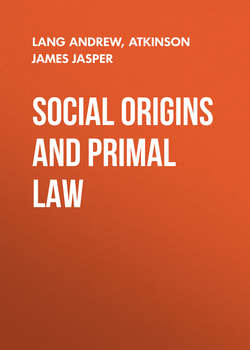Читать книгу Social Origins and Primal Law - Lang Andrew - Страница 29
CHAPTER III
TOTEMS WITHIN THE PHRATRIES
ARUNTA METAPHYSICS
ОглавлениеAgain, as proof that they are in no chrysalis stage, the Arunta possess a reasoned theory of things, so ingenious and complex, so peculiar, so extraordinary, so carefully atheistic, that one could scarcely believe it possible for naked savages, were it not so well attested. The theory is that of the original evolution of types of life into plants and animals, which, with the minimum of extra-natural aid, became human. The human beings possessed souls, which on the death, or disappearance into earth, of the original owners, were hereditary, being reborn into Arunta children. These souls each of a given totem (the plant or animal or other thing which first became human) haunt certain local centres. One place is the centre of Grub totem souls, another of Cat totem souls, and so forth. Each new child is of the totem of the haunted locality where the mother supposes that she conceived it; a totem soul of that locality has become incarnate in her, and from her is born. Thus the wife may be of one totem, the child of another; the husband may be of the wife's totem, of the child's, or of another. The totem is thus no bar to marriage, and is not inherited, all this being the result of the peculiar philosophic system of the Arunta. Their totemism is thus a 'sport,' and not the original form of the institution.
We cannot reverse the case, the philosophy of hereditary totemic souls cannot be the result of the present mode of inheriting the totem from the group of souls that haunts each locality, it cannot be a myth invented to explain that custom. That custom requires the peculiar Arunta soul-belief as its basis, and cannot exist without the belief. If the child received its totem name from the place where it is born, we might say, 'Originally the child was called after the place of its birth.' (Arunta children still receive territorial personal names from the place of their birth.) 'Later, Totemism came in with totem local names, each place having a totem title. The local totem name of the place where a child was born was then given to each child. Still later, arose a myth that totem souls haunted each place, and that the child received its totem name because a local totem soul was incarnated in it, at the place where it was born.' We cannot maintain this theory – which makes the present Arunta belief a myth to explain the present Arunta custom – because that custom it does not explain. The child receives its totem name, not from the place where it is born, but from the place where the totem soul entered into its mother. Nor can we assume that totem names were originally given, not to human groups, but to districts of territory. Thus the present Arunta mode of obtaining the totem, in each case, is the direct result of the Arunta philosophic belief. That belief is peculiar, is elsewhere unheard of, is the property of a tribe distinctly more advanced in marriage rules, and local solidarity, than some of its neighbours, and therefore cannot be primary. It follows that the Arunta mode of obtaining the totem, not by inheritance, is not 'primitive,' is not the original model from which the rest of savage mankind has diverged. This I state, because, as a rule, a belief exists to explain an institution, and, as a rule, an institution is not the result of a belief.
